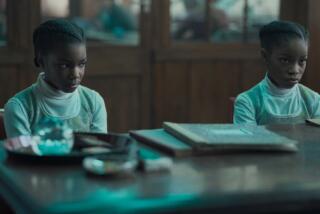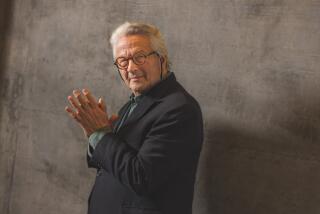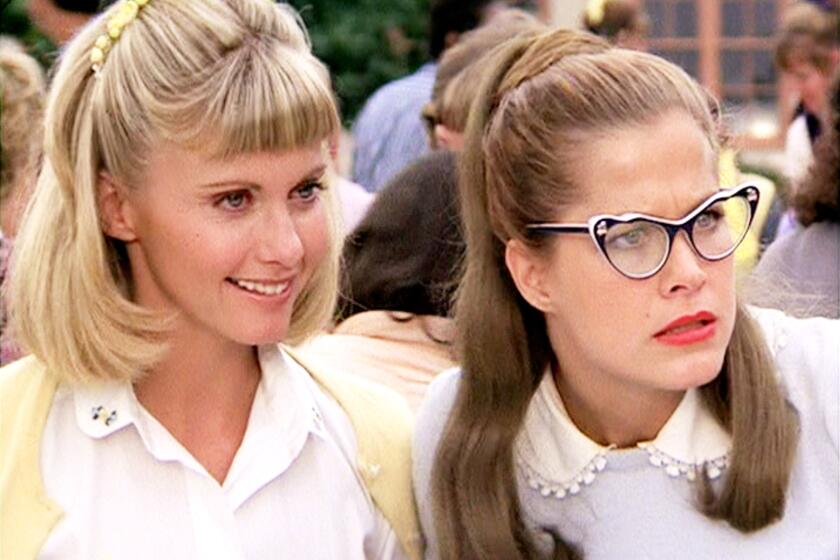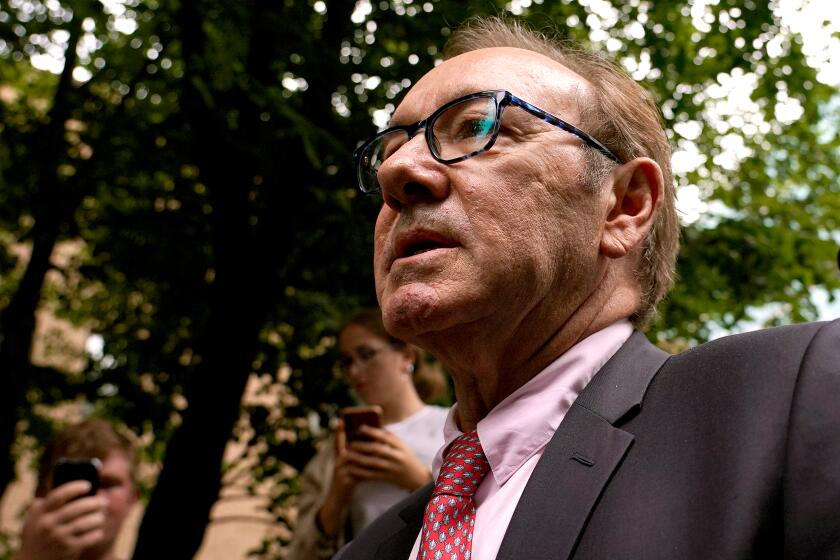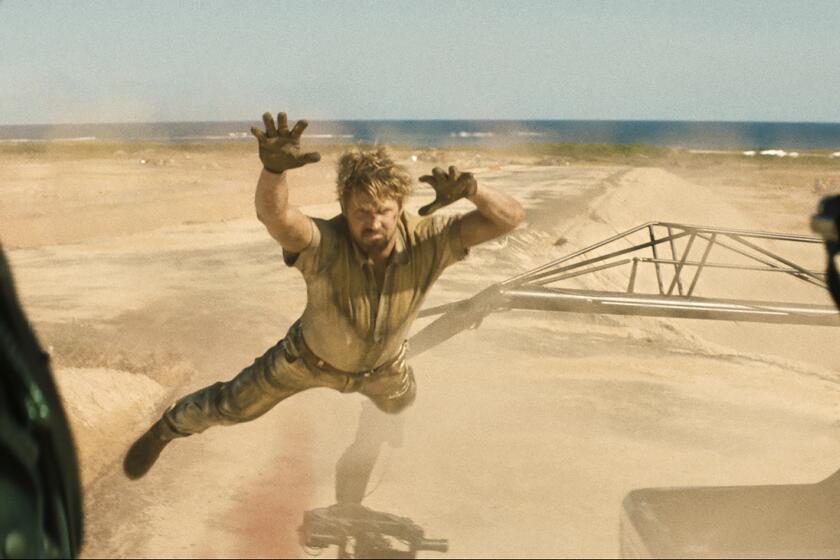Wearin’ another hat
TIM McGRAW has come a long way since he was a boy growing up in a flyspeck of a Southern town called Start, La. For one thing, the Grammy Award-winning country music star has sold over 33 million albums, 4 million singles and placed 26 singles at No. 1. For another, his Soul 2 Soul II Tour 2006 with his wife, Nashville powerhouse Faith Hill, was the highest-grossing tour in country music history. He also received acclaim in the 2004 feature film “Friday Night Lights.”
So what can he do for an encore this year? How about costarring in a new film?
McGraw has a touching performance as a father in “Flicka,” a contemporary adaptation of Mary O’Hara’s beloved novel, “My Friend Flicka,” costarring Alison Lohman and Maria Bello. The film’s soundtrack, executive produced by McGraw, includes a song called “My Little Girl” co-written with Tom Douglas and performed by McGraw as the end title song to the movie, which opens Friday.
On Tuesday, McGraw will be honored with a star on the Hollywood Walk of Fame.
Over the years, much has been written about the ruggedly handsome McGraw: He lives on an 800-acre farm in Franklin, Tenn., an hour south of Nashville; he and Hill were married on a neighboring farm in 1996; and, how at age 11, he stumbled upon a birth certificate showing that major league relief pitcher Tug McGraw was Tim’s biological father. His song “Live Like You Were Dying” took on added poignancy as it coincided with the death of his father in 2004.
We recently caught up by telephone with the singer, who was at his farm enjoying a warm Tennessee morning, a fine morning, he noted, for one of his favorite hobbies: shooting skeet.
*
Did you go back and watch the 1943 film “My Friend Flicka”?
I did. I watched it after I read the script for “Flicka.” I thought it was a great film. Everybody remembers it. There was also a TV show.
*
How different is your film from the classic Roddy McDowall version?
Our film is set in modern times, of course. There’s a 17-year-old daughter instead of an 8- or 9-year-old boy. “Flicka” is more focused on [the family’s fear of] losing the ranch and a new way of life. It’s more focused on the struggle the father is going through trying to save his ranch.
*
How much are horses a part of your life?
Right now, I’m at my farm. We have lots of horses. I grew up with horses. I can’t remember a time when I didn’t ride them. Being around horses, roping and riding, is just what I grew up with.
*
Do your daughters ride horses?
They’re learning.
*
Over the years we’ve seen some country music stars such as Johnny Cash and Reba McEntire court a new fan base by trying their hand at acting. Why don’t we see more of that?
I don’t do it to try to find a fan base. I guess our fan base is pretty solid. I do it as an artist, to discover new things, to see what you can do. I love the art of movies, and I have a great respect for actors. It’s just a learning process. It’s a challenge for me.
*
What movies do you like?
I like all kinds of movies -- action movies, historical fiction. “Braveheart” was probably one of my favorite movies of all time. I just loved that movie.
*
Music seems so prepackaged and posed these days and it’s rare to get a major hit that really stops and makes people think, but your hit “Live Like You Were Dying” really seemed to connect in a deeply emotional way with people. What is it like to perform that in front of an arena full of people?
Everybody can relate to it in a way. That theme has touched perhaps everybody’s life at one time or another. When you sing that song onstage to that many people, you’re just giving the song away. To see their reaction is just so rewarding.
*
The soundtrack to “Flicka” features a song called “My Little Girl” written especially for the film and it marks the first time in your career that you’ve recorded a song that you have a writing credit on. How did it come about?
Tom Douglas is a great songwriter who has written hit songs for me. He was there two nights and was watching some of the dailies we had shot. We were just sitting there and discussing what we wanted the song to say. I have three daughters, so I could put myself in the place of the father in this film. I jotted down the idea. Tom went and put the song together.
*
Your wife, Faith Hill, is a major star in her own right. How do you deal with the egos that come with huge careers and hold your marriage together?
The careers are secondary. Family is first. We were lucky that we both had good careers before we met and married. We put our family and marriage first and everything else finds a place.
*
You’ll be receiving a star on the Hollywood Walk of Fame on Tuesday. For a boy who grew up in Start, La., the son of a single mother who worked at the lunch counter at a Greyhound bus stop, what will that moment mean to you?
It’ll be great. It’s going to be hard to believe that you can do that. I have a great mother and great sisters ... and a great community that I grew up in. Probably only 300 people live there. I can’t get it out of me.
*
You’re one of the few vocal Democrats among the top strata of country music stars. Has that created any problems for you?
No. I have my opinions, but I don’t force them on anybody. I don’t know if I’m right or wrong. I just know that innately it’s the way I feel. In my way of thinking, the best Democratic values is a good way for people to live, but Republicans have some great ideas too. It’s not black and white. It’s individualistic. There are great things on both sides. That’s what makes this country great. It’s just the genetic makeup in me to be a Democrat.
*
Hollywood is often bashed for being out of step with America’s core values. What’s your opinion?
Hollywood is kind of its own little world. Of course, you play make-believe for a living, you can get out of touch. But I also think people in Hollywood really care and form opinions they think are good opinions and right for certain causes. There are people who are out of touch, but those people can live in the country or the city.
-- Robert W. Welkos
More to Read
Only good movies
Get the Indie Focus newsletter, Mark Olsen's weekly guide to the world of cinema.
You may occasionally receive promotional content from the Los Angeles Times.

